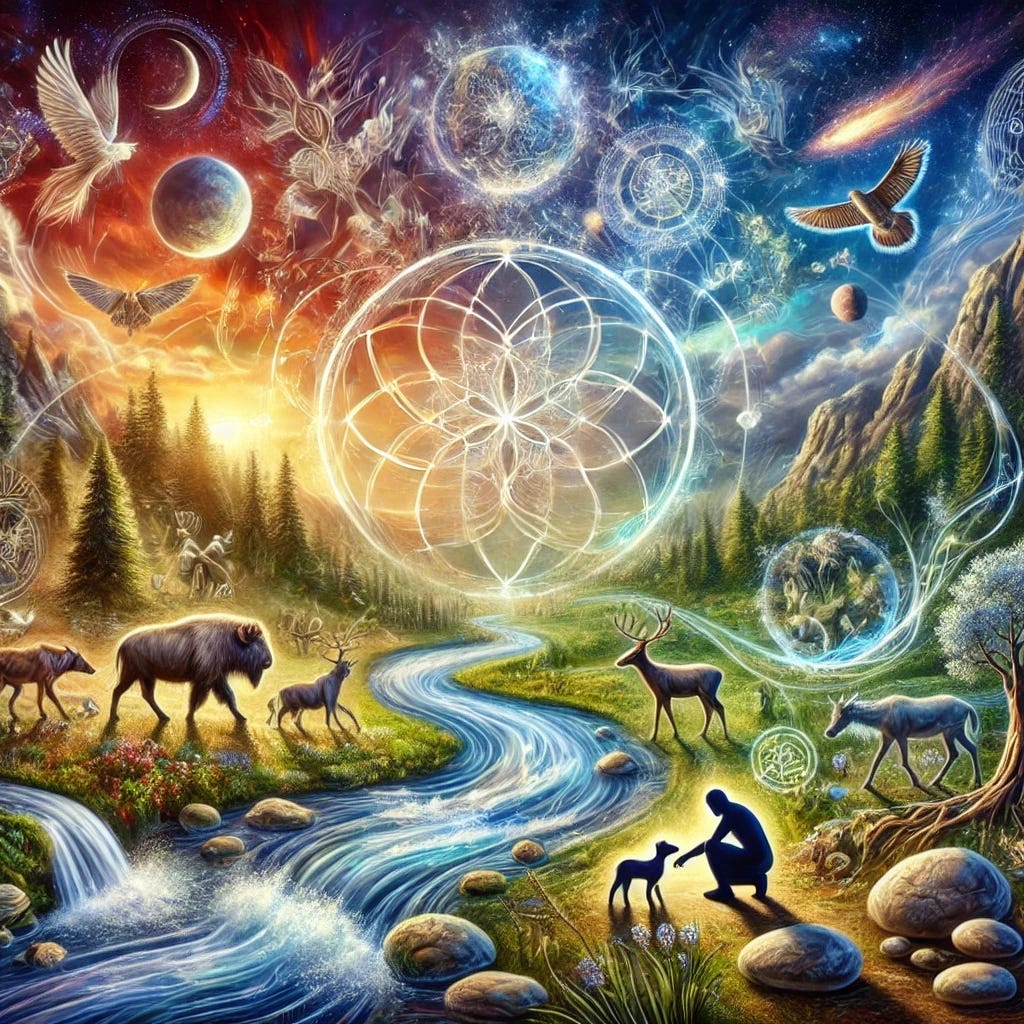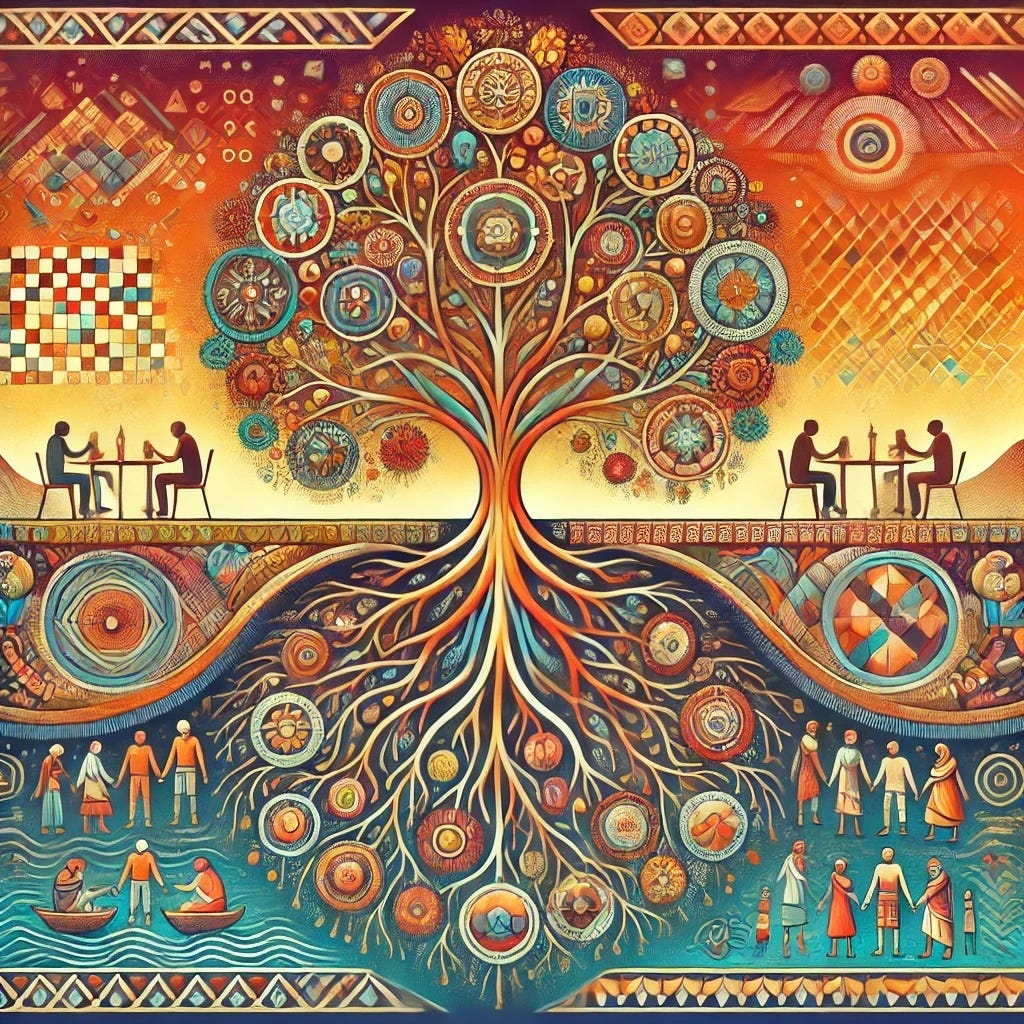Protocols for Regenerative Economy — Part II
By embracing principles of abundance, interdependence, reciprocity, and creativity, we can move beyond traditional market society frameworks — societies where based market based transactions have seeped into all aspects of the society — work, love, relationships, spirituality, sustenance, etc., to foster living economies that deliver what is truly good, useful, and desirable for all. This vision supports community autonomy, local governance, and solidarity, empowering people to shape their futures while honoring cultural values and the interconnectedness of life.
To advance this transition, following protocols are laid out as continuation to the protocols in Part I of this topic.
Protocol 4: Everything is living and has an intrinsic worth
There is life energy within all things, and all things are respected for their potential. There are multiple levels of intelligence that participate in creation and manifestation of our world. Some intelligence acts on timescales much longer than a human life-span. These intelligent forces form stones, geographies, ecosystems. They give structure and life to intricate and complex workings of the ecosystems that we inhabit and ecosystems that inhabit us, on which we rely for our life and enact our life. Every element of the ecosystem participates in the unfolding and evolution of life. And as such everything has consciousness and a worthy role that it plays.
Recognizing the inherent consciousness and spirit in everything invites respect for its agency and its role in world making. A healthy world is one where everything functions in harmony with each other. This harmony can only exist in recognition and respect for everything. Traditional economics centers human rights and human transactions at the expense of nature’s sovereignty and promoting disconnection from the natural world. This prioritization not only threatens the planet’s ecological balance but also undermines the long-term sustainability of human societies, casting a shadow over the future of both humanity and the natural world. In this economy, resources are accumulated by mastering over nature and extracting as much as possible. This creates an economy where social and environmental costs are pushed to indigenous and frontline communities. On a personal and communal level, this is quite often experienced as psychopathological distress of the modern world.
Robert Greenway emphasizes the imbalance caused by such dualism. Indigenous ways offer a healthier ontogeny. Alternative economic frameworks such as Buen Vivir and Sumac Kawsay are good examples of this. “Sumak kawsay” or “Buen Vivir” is an Indigenous Andean philosophy that prioritizes community well-being, harmony with nature, and collective prosperity, in contrast to Euro-centric materialistic paradigms. Its main components include fostering equality, improving citizen capacities, guaranteeing nature’s rights, strengthening national and diverse identities, establishing a sustainable and solidarity-based economic system, promoting public participation, and ensuring access to justice, among others (see Ciafalo 2023).
Protocol 5: All decisions should promote holistic harmony
Modern world is distraught by wars, violence, disjoint families, and a stark move towards individualism. There is an important need for harmony and a remembrance of our inter-connectedness. When decisions are made of fear and mistrust, it creates fear, separation and violence in the world. When decisions are made out of a linear track of profit mindedness it makes the world mechanical and intolerant. When decisions are made from scarcity it creates greed and poverty. Decisions that are made from trust, acceptance, holistic perception, and abundance help create a world of harmony.
Shiva (2005) says that decisions about the use of the earth’s resources, which are shared creates living democracies. Living democracies are based on the intrinsic worth of all species, all peoples, all cultures. Living cultures that grow out of living economies have space for diverse species, faiths, genders, and ethnicities. In a world where these diverse identities intersect, there is an important need for right discernment and right choices. In this way right discernments are grounded in decisions based on holistic harmony.
Protocol 6: Generosity and relationality addresses common pool issues of individuality
Individuals are fundamentally as much an individual as their relationships. Relationships shape the sphere of self, beginning in early childhood and continuing throughout their lives. Margaret Archer’s four-part personhood model provides a nuanced framework to understand this dynamic interplay. First, the “I” represents a continuous self that evolves over time. Second, the “Me” encompasses inherited traits and those shaped by personal effort, such as sex, gender, sexual orientation, and physical characteristics, which are relatively stable yet influential in self-perception and social classification. These traits impact one’s self-concept and internal dialogues, which in turn foster “We” relationships, forming social identities through collective interactions. These relationships generate external characteristics like relational goods, further influencing self-concept. The fourth component, “You,” pertains to roles within societal structures, where individuals contribute to and are shaped by their roles.
Contrarily, mainstream economics often neglects this relational aspect, viewing individuals as independent agents driven by self-interest preferences formed in childhood and fixed by adulthood. This perspective, focused on material exchange and property rights, lacks the depth of relational understanding presented in Archer’s model. This is a reductionist view of individuals as wealth-maximizing agents, neglecting the richer and reflexive conception of humanity, cognition, and interactions (Trosper, 2022).
This emphasis on individualism and refusal to understand the importance of common pool goods leads to ecological & cultural destruction. Settler governments treated colonized and indigenous territory as open access private goods, letting the settlers grab what they could, which created the right condition for mass displacement, genocides, and fragmented world (Trosper, 2022). In ancient African traditions and many other indigenous traditions, persons are non-dual inhabitants of group and individual life. In some African traditions there is a concept of Personalism, which sees matter and essence co-existent in every form as qualities, which while eternally alive in some transformation, are subtle expression of a higher intelligence. No one person or phenomena is ever ultimately separate or autonomous from any other thing. As Bynum (1999) writes,
“Shared consciousness has very many practical aspects. In this approach one focuses on the wider environment both internally and externally. There is a subtle inclination towards nurturance and inter-connectedness with the wider ecology, a relational and resonate affinity in one’s perceptions with a de-emphasis on market values… I am because we are and since we are, therefore I am”.
This guideline can be practiced by a simple awareness where anytime we use the word “I”, we recognize that this I-self is a combination of multiple selves of individual and group identities.
Acknowledgments
This work continues to be influenced by many of my teachers, who are Indigenous to various traditions: Grandmother Kaariina Saarinen, John-Luke Edwards, Auntie Haazel, and Dr. Christopher Jocks (Kahnawake Mohawk). I would also like to honor the traditions and cultures that have preserved and practiced ways of exchange outside of market economies, offering valuable templates for alternative systems. Additionally, I extend my gratitude to my friends and colleagues who have shaped — and continue to shape — my understanding of relationality as it pertains to economies, including Dr. Miku Lenentine, Thyme Parzival, Soryu Forall, and Marisa Hebb.
References
Ciofalo, N. (2023). Towards an emergent conceptualization of decolonial praxis and competencies in community psychology. Global Journal of Community Psychology Practice, 14(1).
Roszak, T., Gomes, M., & Kanner, A.D. (1995). Ecopsychology: Restoring the Earth, healing the mind. Counterpoint.
Delaney, M. (2009). Koyaanisqatsi: The dislocation of feeling. Jung Journal: Culture and Psyche, 3(4), 78–87.
List, G. (1986). Hopi: Songs of the Fourth World.
Shiva, V. (2005). Excerpt from Earth Democracy: Justice, Sustainability, and Peace (pp. 1–18). North Atlantic Books.
Bynum, E. (1999). The African Unconscious (pp. 77–102)
Trosper, R. L. (2022). Indigenous economics: Sustaining peoples and their lands. University of Arizona Press.
Kameʻeleihiwa, L. (1992). Native land and foreign desires. Bishop Museum Press.






